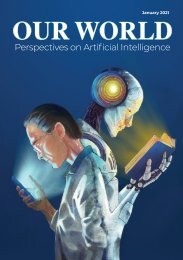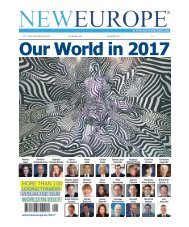Our World in 2018
Leading minds reflect on the state of our societies, and examine the challenges that lie ahead. An edition dedicated to generating ideas that will help form a new vision for our world.
Leading minds reflect on the state of our societies, and examine the challenges that lie ahead. An edition dedicated to generating ideas that will help form a new vision for our world.
Create successful ePaper yourself
Turn your PDF publications into a flip-book with our unique Google optimized e-Paper software.
A Big
Data
Dystopia
By Chelsea Manning
For seven years, I didn’t exist.
While incarcerated, I had no bank
statements, no bills, no credit history.
In our interconnected world of big data, I
person. After I was released, that lack of
information about me created a host of
problems, from difficulty accessing bank
and renting an apartment.
In 2010, the iPhone was only three
years old, and many people still didn’t see
smartphones as the indispensable digital
appendages they are today. Seven years later,
virtually everything we do causes us to bleed
digital information, putting us at the mercy of
invisible algorithms that threaten to consume
our freedom. Information leakage can seem
innocuous in some respects. After all, why
worry when we have nothing to hide?
..
We send emails. Tax records are used to
keep us honest. We agree to broadcast our
location so we can check the weather on our
smartphones. Records of our calls, texts and
NYTCREDIT KIM STEELE/NEW YORK TIMES
Chelsea
Manning
Chelsea E. Manning
is an advocate
of government
transparency, a
transgender rights
activist and a former
United States Army
intelligence analyst.
In 2013 she was
convicted under the
Espionage Act for
documents about
the wars in Iraq
and Afghanistan.
Her sentence was
commuted by
President Obama in
January and she was
released in May.
our billing information. Perhaps that data is
analyzed more covertly to make sure that
of national security, we’re assured.
Our faces and voices are recorded by
surveillance cameras and other internetconnected
sensors, some of which we now
willingly put inside our homes. Every time we
load a news article or page on a social media
site, we expose ourselves to tracking code,
allowing hundreds of unknown entities to
monitor our shopping and online browsing
habits. We agree to cryptic terms-of-service
agreements that obscure the true nature and
scope of these transactions.
According to a 2015 study from the Pew
Research Center, 91 percent of American
adults believe they’ve lost control over how
their personal information is collected and
used. Just how much they’ve lost, however, is
more than they likely suspect.
The real power of mass data collection
lies in the hand-tailored algorithms
capable of sifting, sorting and identifying
patterns within the data itself. When
enough information is collected over time,
governments and corporations can use
or abuse those patterns to predict future
human behavior. Our data establishes a
“pattern of life” from seemingly harmless
digital residue like cellphone tower pings,
76 2018 | OUR WORLD










